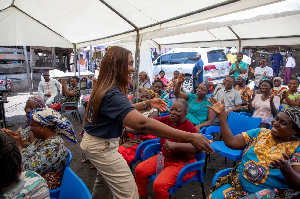In a joint effort with the Society of Women in Taxation, the Ghana Revenue Authority (GRA) has ramped up its educational efforts targeting the market women of Mallam Atta market.
The focus is on emphasizing the importance of promptly filing monthly tax returns for accountability purposes.
A key aspect of this campaign is the introduction of GRA's new online portal for tax payment, alongside promoting good governance practices. Ms. Julie Essiam, Commissioner-General of GRA, highlighted the significance of timely tax return filing to avoid penalties. She emphasized that April has been designated by the Authority for raising awareness among organizations and individuals regarding the necessity of filing returns, paying taxes, and adhering to the law.
Citing the Income Tax Act 2015 (Act 895) and the Revenue Administration Act 2016 (Act 915), taxpayers are reminded to submit their tax returns to the Commissioner-General of GRA no later than four months into the following year.
Ms. Essiam elucidated the benefits of tax payment to the women, including infrastructure development, school construction, healthcare facilities, and other government interventions. She emphasized that the aim is not solely to encourage tax payment but also to outline the tangible advantages derived from it.
Encouraging unity among the women, Ms. Essiam stressed the importance of mutual explanation of tax-related matters for smoother compliance and harmonious coexistence. She expressed hopes for the success of the women's businesses so they could contribute to developmental projects through tax payments.
Mr. Edward Apenteng Gyamera, Commissioner-General in charge of Domestic Tax Revenue at GRA, highlighted the Authority's efforts to enhance client convenience through the online portal. This platform allows taxpayers to file returns, make payments, apply for refunds, adopt cashless policies, and conduct other transactions without physical visits to GRA offices.
Madam Esi Sam, President of the Society of Women in Taxation, emphasized the significance of collaboration due to the substantial presence of women in the informal sector, constituting 69.7% of the population according to census data. She underscored the necessity of encouraging women to fulfill their tax obligations for national development.
Market women engaged with GRA staff on the importance of tax payment and adherence to tax laws.
While expressing satisfaction with the initiative, some urged the government to utilize tax revenue for its designated purposes.
Press Releases of Thursday, 25 April 2024
Source: Dieu Media Ghana
Commissioner-General of GRA leads tax compliance sensitisation campaign
Business
















